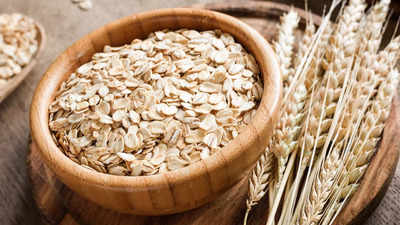[ad_1]

Oats are often touted as a superfood, which is rich in dietary fibre, nutrients, and health benefits. Being heart-friendly, aiding in weight loss, and assisting in digestion, oats have been part of many households for generations. Some individuals have been known to develop constipation after eating oats. Does oats cause constipation? Let’s look deeper into the topic and find out why and how to prevent such happenings.
The role of fibre in digestion
Oats contain large amounts of soluble fibre, mainly in the form of beta-glucan, which can help regulate bowel movements by bulking up stool and promoting gut health. Soluble fibre dissolves in water and can form a gel-like substance, which can slow down digestion and even temporarily cause constipation if not balanced with adequate hydration.
Why oats may cause constipation?
Lack of water
Fibre in oats absorbs water to form bulk, which helps in easy passage through the bowel. But without sufficient water, this process can turn around, making stools harder and causing constipation. Sudden increase in fibre Changing to a high-fibre diet abruptly, especially with oats as the mainstay, can overwhelm the digestive system. Such sudden change may temporarily disrupt bowel habits and cause bloating or constipation.
Lacks insoluble fibre
Although oats are rich in soluble fibre, they are relatively poor in insoluble fibre. That is important because it helps to give stool more bulk and encourages quicker passage through the digestive tract. This makes relying strictly on oats for dietary fibre likely to cause constipation.
Processed oats
High processing levels of oat products, such as instant oats, may have less fibre compared to whole or steel-cut oat options. More-over, processed oat products may also have additives, artificial sweeteners, or preservatives that affect digestion in sensitive individuals.
Digestive conditions
For others, it may be a case of irritable bowel syndrome or a sensitivity to certain compounds in oats that can cause constipation. Others may also experience digestive discomfort if oats are cross-contaminated with gluten during processing.
Tips to avoid constipation when consuming oats
Drink plenty of fluids
Drink plenty of water throughout the day to help the fibre in oats work effectively. Aim for at least 8-10 glasses daily, especially after consuming high-fibre meals.
Gradually increase fibre intake
Introduce oats into your diet gradually to allow your digestive system to adapt. Pair them with other fibre-rich foods to create a balanced fibre profile.
Choose less processed oats
Opt for whole-grain varieties like steel-cut or rolled oats, which retain more nutrients and fibre compared to instant oats.
Add insoluble fibre
Increase your oat-based meals with foods that contain insoluble fibre, such as fresh fruits, vegetables, or nuts, for smoother bowel movements.
Pay attention to your body
Listen to your body as it reacts to oats. If constipation continues, consider consulting with a healthcare professional to rule out any underlying conditions.
While oats themselves are not a direct cause of constipation, factors such as insufficient water intake, sudden dietary changes, or pre-existing digestive issues can lead to discomfort. By consuming oats mindfully and maintaining a balanced diet, you can enjoy their health benefits without worrying about digestive disturbances.
(Images courtesy: Canva)
[ad_2]
Source link


